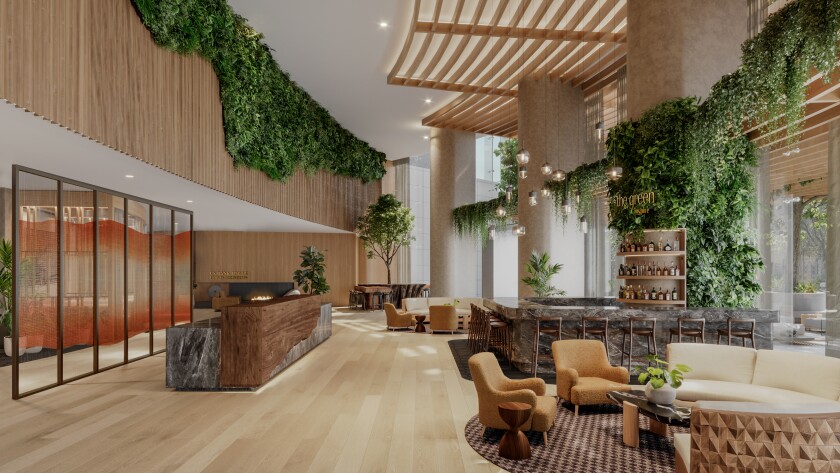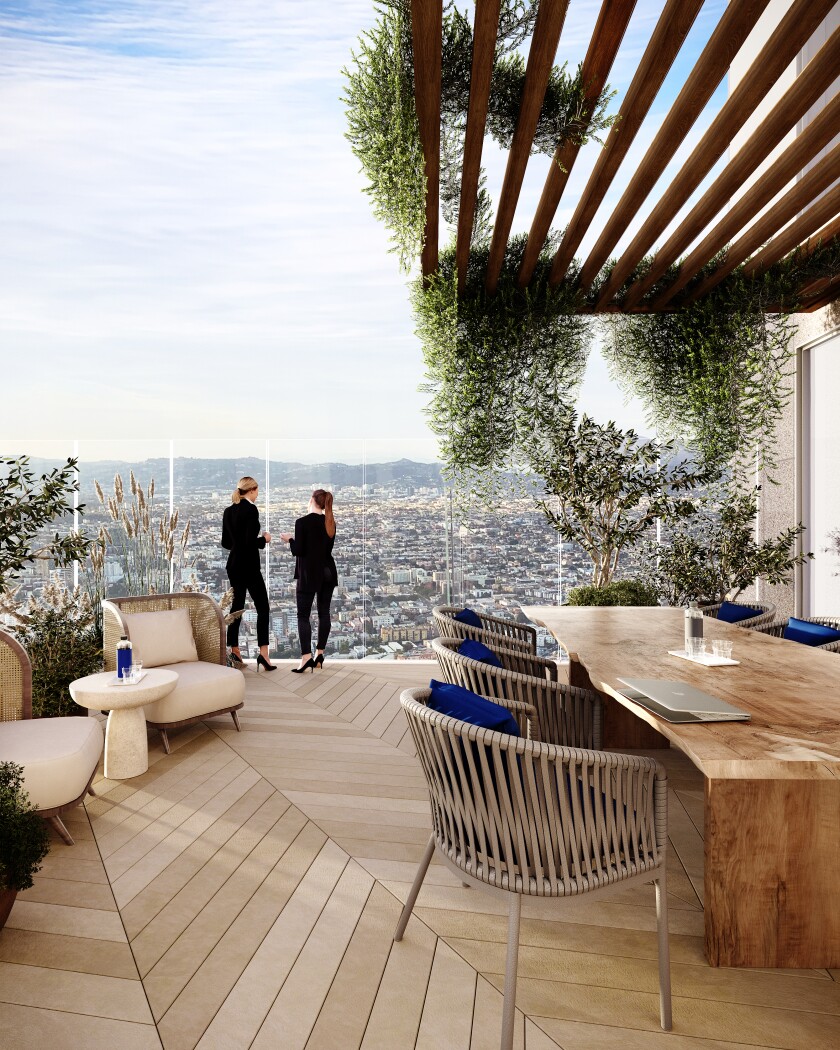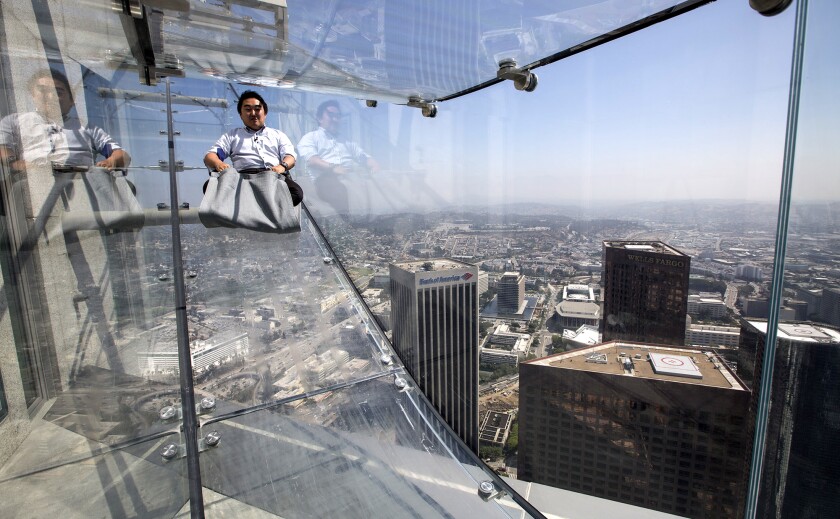The owner of U.S. Bank Tower in downtown Los Angeles will spend $60 million to upgrade and reposition the 73-story skyscraper that has been a prominent feature of the city skyline since was completed in 1989 but has labored to attract tenants in recent years.
Part of the makeover calls for ending aspirations to become a tourist venue by doing away with its long-closed public observation deck and a sky-high outdoor slide, dubbed Skyslide, between two of the top floors that was launched with fanfare in 2016 by the previous owner.

A rendering of the new lobby bar and reception area at U.S. Bank Tower in downtown Los Angeles. The changes intend to make the spaces feel like a hotel.
(Silverstein Properties)
New York developer Silverstein Properties, which bought the building last year for $430 million, hopes to make the imposing tower more appealing to businesses in creative fields that have often turned their backs on high-rises in favor of newer campus-like properties with outdoor space and leisure-oriented amenities.
Silverstein Properties plans to make a visit to U.S. Bank Tower feel more like being in a boutique hotel or high-end residential building than a corporate cathedral, said Jeremy Moss, head of leasing for the company. Hanging out will be encouraged.
“There will be a lot of opportunities for casual, soft seating for meetings or to escape and take a rest,” Moss said.

A rendering of coffee bar that will be installed in the ground floor lobby of the tower.
(Silverstein Properties)
Among them will be a coffee lounge and a bar in the lobby. There will be large communal tables and patio seating at ground-level entrances intended to make the lobby more “permeable” and take advantage of L.A.’s temperate weather, he said.
The 54th floor, where people going higher must change elevators, will be turned into a lounge for tenants. It will have a fireplace, a co-working lounge with workstations, a bar, a grab-and-go cafe selling prepared food items and a full-service kitchen to cater meetings and private events.

The landlord will create new outdoor terraces for tenants on four floors.
(Silverstein Properties)
The new tenant lounge will replace a floor previously dedicated to promoting Skyspace, a former tourist-oriented attraction on the 69th and 70th floors that included observation decks and the glassed-in 45-foot Skyslide hung outside the building that connected the two floors and offered a brief but hair-raising ride. Neither the glass attraction nor high-altitude yoga classes apparently were enough to bring in the masses.
Skyspace was closed before the pandemic and is not coming back, Moss said, in part because conversations with tenants revealed that they did not care for the former attraction.
A member of the media takes a four-second ride 1,000 feet above downtown Los Angeles on the 69th and 70th floors of U.S. Bank Tower during a preview in 2016.
(Brian van der Brug / Los Angeles Times)
“While there are examples of observation decks and tourist attractions coexisting with workspace, in this particular case I think that it was having too much of a negative impact on the experience that we wanted to create and preserve for the companies that are here,” he said.
The upper Skyspace floors will be reconverted to office space for rent, he said. The 1.4-million-square-foot building is 78% leased.
Companies, particularly in the entertainment and technology industries, have gravitated in recent years to offices in airy settings that bring an outdoor feeling into the workplace or allow people to relax or do some work in actual sunshine. Interest in low-density offices reportedly increased during the COVID-19 pandemic.
Owners of some conventional high-rises that were built to serve the corporate culture of the 20th century have responded to the trend by making the outdoor spaces they do have more welcoming, with gardens, coffee stations, decks and seating meant to reverse the air of exclusivity prized by builders and tenants in the 1980s. Public spaces and private offices inside older buildings have been given softer edges.
“Even before the pandemic we saw a movement away from a lot of traditional office customs, whether it’s what people are wearing to work, bringing pets to work” or having convenient food options, Moss said. “A lot of it was designed to make work feel more like home so work became a more inviting place as opposed to a foreboding place.”
At U.S. Bank Tower, the upscale 71Above restaurant on the 71st floor is open and will continue to operate, Moss said. A large restaurant space on lower floors previously occupied by a Chinese restaurant will become Market Creations, a fast-casual eatery expected to open by Labor Day.
The other improvements to the building will take a year to 18 months, he said, and will also include upgrades to the gym, elevators and valet parking area of the garage.
The construction of U.S. Bank Tower was perhaps the most high-profile achievement of Maguire Thomas Partners, a Los Angeles real estate development company that was one of the largest in the country in the 1980s and 1990s. Founder Robert F. Maguire III died Tuesday. The skyscraper was first called Library Tower and was known for a time as First Interstate World Center.

